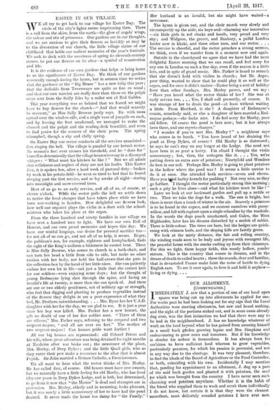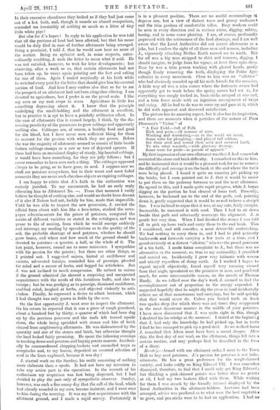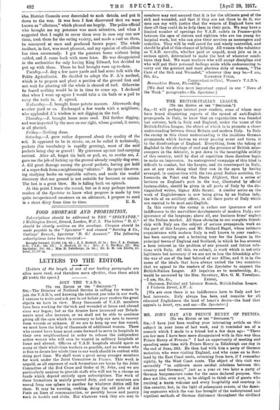OUR ALLOTMENT.
[COMMUNICATED.]
IMMEDIATELY J. saw that a portion of one of our local open spaces was being cut up into allotments he applied for one. For weeks past he had been looking out for any sign that the Local Authorities were starting allotments, but saw and heard nothing, and the sight of the portions staked out, and in some cases already dug over, was the first intimation we had that there were any to be had in the neighbourhood. J. has no knowledge whatever of work on the land beyond what he has gained from amusing himself in a small back Orden growing lupins and Mrs. Simpkins and endeavouring to grow roses and tomatoes. But if his knowledge is slender his ardour is tremendous. It has always been his ambition to have sufficient land whereon to grow vegetables, particularly potatoes, for which his passion is perennial, and not in any way due to the shortage. it was very pleasant, therefore, to find the ideals of the Board of Agriculture or the Food Controller, or both, coinciding with his own. Incidentally I may mention that, pending his appointment to an allotment, J. dug up a part of the said back garden and planted it with potatoes, the seed for which was brought from the country I have never seen such charming seed potatoes anywhere. Whether it is the habit of the friend who supplied them to wash and scrub them individually I do not know, but certain it is that they were the cleanest smoothest, most delicately rounded potatoes I have ever met. In their excessive cleanliness they looked as if they had just come out of a hot bath, and, though it sounds an absurd comparison, reminded me irresistibly of nothing so much as a litter of tiny little white pigs !
But alas for J.'s hopes ! In reply to his application he was told that all the portions of land had been allotted, but that his name would bo duly filed in ease of further allotments being arranged. Being a pessimist, I told J. that he would now hear no more of the matter. Being an optimist and, in some respects, extra• ordinarily confiding, J. took the letter to mean what it said. He was not eatisfied, however, to wait for later developments ; but observing, after a week or so, that certain allotments had not been taken up, he wrote again pointing out the fact and asking for one of them. Again I smiled sceptically at his faith while he watched every pest for the letter that should give him his coveted portion of land. And here I may confess also that so far to me t he prospect of an allotment had not been altogether alluring. I am devoted to agriculture, but I prefer it on the grand scale. I like my corn or my root crops in acres. Agriculture in little has something depressing about it. I know that the principle underlying the small-holding and the allotment is excellent, but in practice it is apt to have a painfully utilitarian effect. In the case of allotments this is caused largely, I think, by the dis- tressing proclivity of the possessors to grow cabbage and apparently nothing else. Cabbages are, of course, a healthy food and good for the blood, but I have never seen sufficient liking for them to account for the passion with which they are grown. Before the war the majority of allotments seemed to consist of little beside forlorn cabbage-stumps or a row or two of dejected sprouts. If there had been an occasional display of sturdy, big-hearted cabbage, it would have been something, for they are jolly fellows: but I never remember to have seen such a thing. The cabbages appeared always to be going, or to have gone, to seed. I suppose now we shall see potatoes everywhere, but in their worst and most faded moments they are never such cheerless objects as expiring cabbages.
I am happy to relate that J.'s faith in the authorities was entirely justified. To my amazement, he had an early reply
allocating him to Allotment No. From that moment I verily believe he thought of nothing else, and would no doubt have dreamt of it also if Nature had not, luckily for him, made that impossible. Until he was able to inspect the new possession, J. carried the official form about with him like a love-letter, studied the news- paper. advertisements for the prices of potatoes, compared the merits of different varieties as stated in the catalogues, and was prone to fits of musing, from which he would emerge suddenly and interrupt my reading by speculations as to the quality of the soil, the probable shortage of seed potatoes, whether he should grow beans, and where and how much of the ground should be devoted to potatoes—a quarter, a half, or the whole of it. The last point, however, roused me to some resistance. I sympathize with his passion for the potato ; but there are other things, as I pointed out. I suggested onions, hinted at cauliflower and carrots, advocated turnips, reminded him of parsnips, pleaded for salad and a corner of herbs, and begged for artichokes. But J. was not inclined to much compromise. He unbent to onions if the ground admitted (he showed a surprising and unexpected acquaintance with the needs of this fastidious bulb), and also to turnips: but he was grudging as to parsnips, dismissed cauliflower, snubbed salad, laughed at herbs, and objected violently to arti- chokes. Finally, he expressel a desire to admit beetroot, which 1 had thought was only grown in fields by the acre.
On the first opportunity J. went over to inspect the allotment. On his return he reported that it was a piece of rough grassland, about a hundred feet by thirty, a quarter el which had been dug up by the previous pomessor and the turfs left turned upside down, the whole being sprinkled with stones and bits of brick cleared from neighbouring allotments. He was disheartened by the quantity and size of the stones and brick, but otherwise thought the land looked fairly promising. He spent the following evenings in tracking down seed potatoes and buying potato manure. Incident- ally he commandeered shopping-baskets and enamelled trays as receptacles and, to my horror, deposited an assorted selection of seed in the linen cupboard, because it was dry !
J. started work on the Sunday, his outfit consisting of nothing more elaborate than a spade. It had not been my intention to take any active part in the operations. In the warmth of his enthusiasm my scepticism was fast being dispersed, but I had decided to play the part only of sympathetic observer. Sunday, however, was such a fine sunny day that the call of the land, which lied already sounded in my ears, became insistent, and I went over to him during the morning. It was my first acquaintance with the allotment ground, and I made a rapid survey. Fortunately it is in a pleasant position. There are no sordid surroundings tg, depress one, but a view of distant trees and grassy enelosuree and the trim gardens of comfortable villas. Busy workers could be seen in every direction and in various attire, digging, raking, hoeing, and in some eases planting. I am, of course, profoundly impressed with the seriousness of the food shortage, and I am well aware that the Local Authorities did not invent allotments ns a joke, but I confess the sight of all these men and women, including J., vigorously attacking Mother Earth moved inc to mirth. Not far off was a big man stripped to shirt and trousers, digging, I should imagine, to judge from his vigour, at least three spits deep. Near by was a trim person working with gloved hands, gently though firmly removing the turfs, displaying the Polito Agri- culturist in every movement. Close to him was an "allot tee" who had obviously rounded up all his male friends for the occasion. A little way off was a trim corner where the fortunate owner had apparently got to work before the spring snows had set in, for everything was snugly tucked in, boan-sticks arrayed at one end, and a trim fence made with an ingenious arrangement of twigs and string. All he had to do was to come up and gaze at it, which he did with apparent and deserved satisfaction.
The picture has its amusing aspect, but it also has its inspiration, and there are moments when it partakes of the nature of Piers Plowman's " Vieion " of "A Fair Field,—full of Folk
Rich and poor,—all manlier of men,
Working and wandering,—as in the world we must.
Some wore for ploughing.—and played full seldom. Sot their seed and sowed their seed and sweated hard, To win what wastrels,—with gluttony destroy. Some were for pride—in parade of apparel."
My first impression of our own allotment was that J. had somewhat overrated the stone and brick difficulty. I remarked on this to him, and he insinuated that it would be a pleasant task for me to remove the difficulty and arrange it on the bank at the end where the turfs were being placed. I found it quite an amusing job picking up the bricks, but I soon pointed out to J. that it would be easier to put them on the pathway between us and the next allotment. He agreed to this, and I made quite rapid progress, while J. began digging on the portion he had cleared of loose turf. Presently, however, he beckoned are to the end of the path, and, pointing down it, gently suggested that it would be as well to have a otraigkt line. I was inclined to argue that it was, at any rate, fairly straight. Inexorable, ho measured it with cord. Then I had to sit down beside that path and reluctantly rearrange the alignment. J. :is gentle but s-cry firm. When I had finished the stones I was told off to pick up loose turfs and carry them to the end bank. This
I considered, and still consider, a most detestable undertaking. We had nothing to carry them in, and I had to plod patiently
backwards and forwards carrying a few turfs at a time, and I gazed enviously at a distant " allottee " who was the proud possessor, of a tin bath. I made bitter complaint to J., but there was no alternative at the moment, so, true to my nationality, I grumbled and carried on. Incidentally I grew very intiinato with worms and utterly regardless of damp earth. As I worked I began to regard myself objectively, found myself very amusing viewed from that angle, speculated on the primitive in man, and pondered much, for some unaccountable reason, on the novels of Thomas Hardy. As we talked over the day's work J. seemed to find the accomplishment out of proportion to the energy expended. I suggested hopefully that Ile might dig the grass in (and incidentally relieve me of that monotonous turf-carrying), but he said quickly that that would never do. Unless you buried turfs at least two spades deep (for which there was not time) they reappeared in the most disastrous manner in the middle of your potatoes. I have since discovered that J. was quite right in this, though I doubted his knowledge at the moment. I stated at the beginn:vg that J. had only the knowledge he had picked up, but in truth I find he has managed to pick up a good deal. As we walked home J. remarked that Adam must have been a sound sleeper. After this, the first day of our work on the allotment, things fell into a certain routine, and may perhaps best be described in the form
of a diary.
liondcy.—Armed with our allotment order, I went to the Town Hall to buy seed potatoes. J.'s passion for potatoes is not indis- criminate. He has a great preference for the rough-skinned variety, and looks coldly on King Edward VIL I was somewhat dismayed, therefore, to find that I could only get King Edward ; but thinking a pink-skinned potato was better than no potato at all, I had my two baskets filled with them. While waiting for them I was struck by the friendly interest displayed by the Local Authorities in the allotment-holders. Lectures had been arranged, advice was proffered as to what were the best vegetabh I to grow, and pea-sticks were to be had on application. I had no idea District Councils ever descended to such details, and put it down to the war. It was here I first discovered that we were
known as " allottees," which pleased me hugely. The polite official
who brought me my potatoes was most attentive, and when I suggested that I ought to cover them over in case any one saw
them, took them for the eating variety, and made a raid on them, he concurred at once and produced brown paper. The whole incident, in fact, was most pleasant, and my opinion of officialdom
has risen enormously. I got the potatoes home without being raided, and J. eamo back with more later. He was disappointed in the authorities for only having King Edward, but decided to put up with them. Those he had brought were up-to-date. Tuesday.—J. dug a few more yards and had some talk with the Polite Agriculturist. He decided to adopt the P. A.'s method, which is to prepare and plant a portion of the ground first and not wait for planting till the whole is cleared of turf. Otherwise he feared nothing would be in in time to come up. I declared that when I went up again I would take a tin bath or a pail to carry the turfs in. J. agreed.
Wednesday.—J. brought home potato manure. Afterwards dug another yard or so. Exchanged a few words with a neighbour, who applauded J.'s wisdom in not digging-in the turf.
Thursday.—J. brought home more seed. Did further digging, and was inspected by the man on our right, whose ground, it seems, is all planted.
Friday.—Nothing done.
Saturday.—j. grew rather depressed about tho quality of the soil. It appeared to be in strata, or, as be called it technically,
pockets (his vocabulary is rapidly growing), most of the said pockets being clay or gravel ! My grievance against turf-carrying revived. After all, forgot tin bath or pail, so, to soothe me, J. gave me the job of forking up the ground already roughly dug over. J. did great damage among the gravel pockets, having got hold of a super-fork from a neighbouring " allottee." He spent the even- ing studying books on vegetable culture, and made the woeful discovery that our ground is not suitable for beetroot or onions. The last is a great blow. He is falling back on spinach.
At this point I leave the record, but as it may perhaps interest readers of the Spectator to 'brow what progress is made by two quite inexperienced amateurs on an allotment, I propose to send
in a short diary from time to time. E. B.




































 Previous page
Previous page